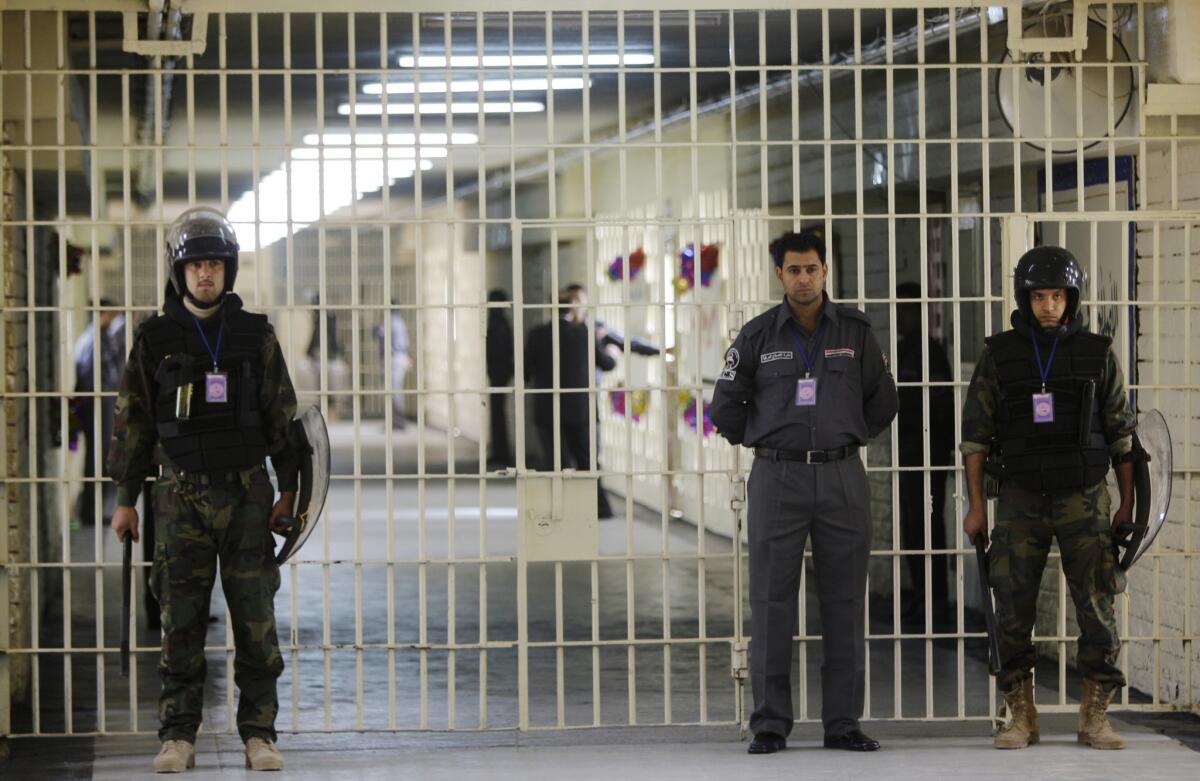Iraqi prison breaks signal escalating Al Qaeda violence

Iraqi security forces on Tuesday set up dragnets at airports and along highways leading out of the country in a hunt for hundreds of Al Qaeda-allied militants broken out of jail by a massive, coordinated assault on two prisons near Baghdad, Arab media reported.
It was the most audacious attack on Iraqi security since a wave of sectarian violence began in April. More than 3,000 have been killed, including at least 500 this month alone.
Al Qaeda’s Iraqi affiliate, the Islamic State of Iraq and the Levant, issued a statement claiming responsibility for the dual breakout operations at the infamous Abu Ghraib prison west of Baghdad and at the detention center north of the capital in Taji. The Al Arabiya news service carried extensive citations from the terrorist group’s statement, including the claim that 500 inmates had been freed, many high-value militants captured by U.S. forces years ago.
“The holy warriors, after months of preparation and planning, targeted two of the largest prisons of the Safavid government,” the Al Qaeda affiliate said in the statement posted on jihadist websites across the Middle East. Safavid refers to what Sunni Muslims regard as an overly Iran-influenced Shiite leadership in Baghdad.
At least 50 people were killed in the synchronized prison attacks, the Iraqi Interior Ministry reported. Among them were 26 prison guards and Iraqi soldiers slain by suicide bombers as the attacks got underway late Sunday.
The ministry statement said some prison guards appeared to have been colluding with the Al Qaeda attackers.
“There has been a conspiracy between some of the guards of both prisons and the terrorist gangs that attacked the prison,” Al Jazeera’s correspondent in Baghdad quoted the government statement as saying. “That was one of the main reasons for the escalation of events which led to these consequences.”
The Justice Ministry reported Tuesday that 260 prisoners had escaped from Abu Ghraib. Other officials put the number at 500 on Monday but said about 150 were recaptured as police and troops fanned out to set up roadblocks on highways leading to Jordan and Syria.
The escapes of Al Qaeda operatives is expected to intensify fears among Iraqis that their government has shown itself to be incapable of protecting them since U.S. forces withdrew two years ago, the Gulf News agency said in a report about Al Qaeda’s ascendancy in Iraq and neighboring, civil-war-torn Syria.
The Interior Ministry reported the assaults and an unspecified number of escapes from Abu Ghraib but said there was no breakout from Taji. Gulf News said U.S. officials monitoring the security situation in Iraq estimated the number of escapees to be between 500 and 600.
Iraqi lawmakers who said they had been briefed by security officials said they were told some top emirs were among those freed in the raids, some awaiting execution for their part in deadly acts of insurgency, the news agency said.
The Islamic State of Iraq and the Levant had put Justice officials on notice a year ago that it intended to target courts, security forces and prisons to free its detained fighters and bolster the battle against Shiites.
Abu Ghraib, which was a venue for abuse and torture of late Iraqi President Saddam Hussein’s enemies, has been under Iraqi administration since U.S. forces withdrew in 2011. It became notorious in 2004, a year after the U.S. invasion to topple Hussein, when photographs were leaked to international media showing U.S. troops terrorizing captives with snarling dogs and subjecting them to humiliating nude poses.
ALSO:
Myanmar begins new round of political-prisoner releases
Suicide bomber on donkey kills 3 NATO troops in Afghanistan
Egypt unrest: At least 6 killed in clashes near Cairo University
More to Read
Start your day right
Sign up for Essential California for news, features and recommendations from the L.A. Times and beyond in your inbox six days a week.
You may occasionally receive promotional content from the Los Angeles Times.







